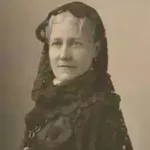 | |
Louie | |
| Author | Harriet Prescott Spofford |
|---|---|
| Published |
1872
|
| Language | English |
| Nationality | American |
| Genre | Supernatural |
1872 Short Story
Louie
Louie is an English Supernatural short story by American writer Harriet Prescott Spofford. It was first published in 1872. Louie was published in the anthology, Not Pretty,But Precious, and Other Short Stories (1872).
Louie
by Harriet Prescott Spofford
The great river was flowing peacefully down to the sea, opening its blue tides at the silver fretting of the bar into a shallow expanse some miles in width, a part of which on either side overlay stretches where the submerged eel-grass lent a tint of chrysoprase to the sheathing flow, and into which one gazed, half expecting to see so ideal a depth peopled by something other than the long ribbons of the weed streaming out on the slow current–the only cool sight, albeit, beneath the withering heat of the day across all that shining extent. Far down the shores, on the right, a line of low sand-hills rose, protecting the placid harbor from sea and storm with the bulwark of their dunes, whose yellow drifts were ranged by the winds in all fantastic shapes, and bound together by ropes of the wild poison-ivy and long tangles of beach-grass and the blossoming purple pea, and which to-day cast back the rays of the sun as though they were of beaten brass. Above these hills the white lighthouse loomed, the heated air trembling around it, and giving it so vague and misty a guise that, being by itself a thing of night and storm and darkness, it looked now as unreal as a ghost by daylight. On the other side of the harbor lay the marshes, threaded by steaming creeks, up which here and there the pointed sails of the hidden hay-barges crept, the sunshine turning them to white flames: farther off stood a screen of woods, and from brim to brim between swelled the broad, smooth sheet of the river, coming from the great mountains that gave it birth, washing clean a score of towns on its way, and loitering just here by the pleasant old fishing-town, whose wharves, once doing a mighty business with the Antilles and the farther Indies, now, in the absence of their half dozen foreign-going craft, lay at the mercy of any sand-droger that chose to fling her cable round their capstans. A few idle masts swayed there, belonging to small fishers and fruiters, a solid dew of pitch oozing from their sides in the sun, but not a sail set: a lonely watchman went the rounds among them, a ragged urchin bobbed for flounders in the dock, but otherwise wharves and craft were alike forsaken, and the sun glared down on them as though his rays had made them a desert. The harbor-water lay like glass: now and then the tide stirred it, and all the brown and golden reflections of masts and spars with it, into the likeness of a rippled agate. Not one of the boats that were ordinarily to be seen darting hither and yon, like so many water-bugs, were in motion now; none of the white sails of the gay sea-parties were running up and swelling with the breeze; none of the usual naked and natatory cherubs were diving off the wharves into that deep, warm water; the windows on the seaward side of the town were closed; the countless children, that were wont to infest the lower streets as if they grew with no more cost or trouble than the grass between the bricks, had disappeared in the mysterious way in which swarms of flies will disappear, as if an east wind had blown them; but no east wind was blowing here. In all the scene there was hardly any other sign of life than the fervent sunbeams shedding their cruel lustre overhead: the river flowed silent and lonely from shore to shore; the whole hot summer sky stretched just as silent and lonely from horizon to horizon; only the old ferryman, edging along the bank till he was far up stream, crossed the narrower tide and drifted down effortless on the other side; only an old black brig lay at anchor, with furled sail and silent deck, in the middle channel down below the piers, and from her festering and blistering hull it was that all the heat and loneliness and silence of the scene seemed to exude–for it was the fever-ship.
It was a different picture on the bright river when that brig entered the harbor on the return of her last voyage, to receive how different a welcome! But pestilence raged abroad in the country now, and the people of the port, who had so far escaped the evil, were loth to let it enter among them at last, and had not yet recovered from the recoil of their first shock and shiver at thought of it in their waters–waters than which none could have fostered it more kindly, full as they were in their shallow breadth of rotting weeds and the slime of sewers. Perhaps the owner of some pale face looked through the pane and thought of brother or father, or, it may be, of lover, and grew paler with pity, and longed to do kind offices for those who suffered; but the greater part of all the people hived upon the shores would have scouted the thought of going out with aid to those hot pillows rocking there upon the tide, and of bringing back infection to the town, as much as though the act had been piracy on the high seas. And they stayed at home, and watched their vanes and longed for an east wind–an east wind whose wings would shake out healing, whose breath would lay the destroying fever low; but the east wind refused to seek their shores, and chose rather to keep up its wild salt play far out on the bosom of its mid-sea billows.
Yes, on that return of the last voyage of the brig the stream had swarmed with boats, flags had fluttered from housetops and staffs, piers and quays had been lined with cheering people, all flocking forth to see the broken, battered little craft; for the brig had been spoken by a tug, and word had been brought to the wharves, and had spread like wild-fire through the town, that, wrecked in a tempest and deserted by the panic-stricken crew, the steadfast master and a boy who stood by him had remained with her, had refitted her as best they might when the storm abated, and had brought her into port at last through fortunate days of fair weather and slow sailing. The town was ringing with the exploit, with praise of the noble faithfulness of master and boy; and now the river rang again, and no conquering galley of naval hero ever moved through a gladder, gayer welcome than that through which the little black brig lumbered on her clumsy way to her moorings.
But though all the rest of the populace of the seaport had turned out with their greetings that day, there was one little body there who, so far from hurrying down to shore or sea-wall with a waving handkerchief, ran crying into a corner; and it was there that Andrew Traverse, the person of only secondary importance in the river scene, rated as a boy on the brig’s books, but grown into a man since the long voyage began,–it was there he found her when the crowd had let him alone and left him free to follow his own devices.
“It’s the best part of all the welcome, I declare it is!” said he, standing in the doorway and enjoying the sight before him a moment.
“Oh, Andrew,” cried the little body with a sob, but crouching farther away into the corner, “it was so splendid of you!”
“What was so splendid of me?” said he, still in the doorway, tall and erect in the sunshine that lay around him, and that glanced along his red shirt and his bronzed cheek to light a flame in the black eyes that surveyed her.
“Standing by him so,” she sobbed–“standing by the captain when the others left–bringing home the ship!”
“It’s not a ship–it’s a brig,” said Andrew, possibly too conscious of his merit to listen to the praise of it. “Well, is this all? Ain’t you going to shake hands with me? Ain’t you glad to see me?”
“Oh, Andrew! So glad!” and she turned and let him see the blushing, rosy face one moment, the large, dark, liquid eyes, the tangled, tawny curls; and then overcome once more, as a sudden shower overcomes the landscape, the lips quivered again, the long-lashed eyelids fell, and the face was hidden in another storm of tears. And then, perhaps because he was a sailor, and perhaps because he was a man, his arms were round her and he was kissing off those tears, and the little happy body was clinging to him and trembling with excitement and with joy like a leaf in the wind.
Certainly no two happier, prouder beings walked along the sea-wall that night, greeted with hearty hands at every step, followed by all eyes till the shelter of deepening dusk obscured them, and with impish urchins, awe-struck for once, crying mysteriously under their breath to each other, “That’s him! That’s the feller saved the Sabrina! That’s him and her!” How proud the little body was! how her heart beat with pleasure at thought of the way in which all men were ready to do him honor! how timidly she turned her eyes upon him and saw the tint deepen on his cheek, the shadow flash into light in his eye, the smile kindle on his lips, as he looked down on her–glad with her pride and pleasure, strong, confident, content himself–till step by step they had left the town behind, wandering down the sandy island road, through the wayside hedge of blossoming wild roses and rustling young birches, till they leaned upon the parapet of the old island bridge and heard the water lap and saw the stars come out, and only felt each other and their love in all the wide, sweet summer universe.
Poor Louie! She had always been as shy and wary as any little brown bird of the woods. It was Andrew’s sudden and glorious coming that had surprised her into such expression of a feeling that had grown up with her until it was a part of every thought and memory. And as for Andrew–certainly he had not known that he cared for her so much until she turned that tearful, rosy face upon him in welcome; but now it seemed to him that she had been his and he hers since time began: he could neither imagine nor remember any other state than this: he said to himself, and then repeated it to her, that he had loved her always, that it was thought of her that had kept him firm and faithful to his duty, that she had been the lodestar toward which he steered on that slow homeward way; and he thanked Heaven, no doubt devoutly enough, that had saved him from such distress and brought him back to such bliss. And Louie listened and clung closer, more joyful and more blest with every pulse of her bounding heart.
After all, sudden as the slipping into so divine a dream had been, it had need to be full as intense and deep, for it was only for a little while it lasted. A week’s rapt walking in these mid-heavens, where earth and care and each to-morrow was forgotten, and there broke in upon them the voice of the Sabrina’s owner seeking for Andrew Traverse.
Of course such conduct as that of one who preferred to do his utmost to save a sinking ship rather than seek safety with her flying crew, was something too unusual to go unrewarded: it must be signalized into such a shining light that all other mariners must needs follow it. And if the sky had fallen, Andrew declared, he could have been no more surprised than he was when he found himself invited with great ceremony to a stately tea-drinking at the house of the owner of the Sabrina. “Now we shall catch larks,” said he; and dressed in a new suit, whose gray tint set off the smoothness of his tanned cheek with the color sometimes mantling through the brown, he entered the house with all the composure of a gentleman used to nothing but high days and holidays. Not that either the state or ceremony at Mr. Maurice’s required great effort to encounter with composure–trivial enough at its best, wonderful though it was to the townsfolk, unused to anything beyond. But Andrew had seen the world in foreign parts, and neither Mr. Maurice’s mansion-house and gardens, nor his gay upholstery, nor his silver tea-service, nor his condescending manners, struck the least spark of’ surprise from Andrew’s eyes, or gave them the least shadow of awe.
“This is some mistake,” said the owner graciously, after preliminary compliment had been duly observed. “How is it that you are rated on the books as a boy–you as much a man as you will ever be?”
“A long voyage, sir, slow sailing and delays over so many disasters as befell us, three years out in the stead of a year and a half–all that brings one to man’s estate before his reckoning.”
“But the last part of the time you must have done able seaman’s service?”
“The captain and I together,” said Andrew with his bright laugh. “We were officers and crew and passengers, cox’n and cook, as they say.”
“A hard experience,” said Mr. Maurice.
“Oh, not at all, but worth its weight in gold–to me, at least. Why, sir, it taught me how to handle a ship as six years before the mast couldn’t have done.”
“Good! We shall see to what purpose one of these days. And you have had your share of schooling, they tell me?”
“All that the academy had to give, sir.”
“And that’s enough for any one who has the world to tussel with. How should you like to have gone through such hard lines, Frarnie?” turning to his daughter, a pale, moon-faced girl, her father’s darling.
“Were you never afraid?” she asked in her pretty simpering way.
“Not to say afraid,” answered Andrew, deferentially. “We knew our danger–two men alone in the leaky, broken brig–but then we could be no worse off than we were before; and as for the others–“
“They got their deserts,” said Mr. Maurice.
“The poor fellows left us in such a hurry that they took hardly any water or biscuit; and at the worst our fate could not be so bad as theirs, under the hot sun in those salt seas.”
“Well, well!” said Mr. Maurice, who loved his own ease too much to like to hear of others’ dis-ease. And to turn the conversation from the possible horrors into which it might lapse, he invited his guest out into his gardens, among his grapehouses, his poultry and his dogs. It was a long hour’s ramble that they took there, well improved on both sides, for Andrew of course knew it to be for his interest to please the brig’s owner; and Mr. Maurice, who prided himself on having a singularly keen insight into character, studied the young man’s every word and gesture, for it was not often that he came across such material as this out of which to make his captains; and to what farther effect in this instance be pursued his studies might have been told, by any one keener than himself, through the tone of satisfaction with which, on re-entering the parlor, he bade his daughter take Andrew down the rooms and tell him the histories of the surprising pictures there. For Mr. Maurice, one of the great fortunes of the seaport, being possessed by a mania of belief that every youth who cast tender eyes upon his daughter cast them not on her, but on her future havings and holdings, had long since determined to select a husband for her himself–one who evinced no servile reverence for wealth, one whom he could trust to make her happy. “And here,” he said, “I am not sure but that I have him.”
When Andrew went in to see Louie a moment on his way home that night, he was in great spirits over the success of his visit, and, dark as it was, made her blush the color of the rose over the low doorway where they stood when he asked how she would like to go captain’s wife next voyage. And then he told her of Mr. Maurice’s scrutiny and questioning, and the half hint of a ship of his own to sail some day, and of the pale-faced Miss Frarnie’s interest, and of the long stroll down the parlors among the pictures, the original of one of which he had seen somewhere in the Mediterranean, when he and a parcel of sailors went ashore and rambled through the port, and looked in at a church, where, in the midst of music and incense and a kneeling crowd, they were shearing the golden locks off of young girls and making nuns of them. And Andrew forgot to tell of the way in which Miss Frarnie listened to him and hung upon his words: indeed, how could he? Perhaps he did not notice it himself; but if he had had a trifle more personal vanity, and had seen how this pale young girl–forbidden by a suspicious father much companionship with gallants–had forgotten all difference of station and purse, and had looked upon him, nobly made, handsome, gay, knowing far more than she did, much as upon a young god just alighted by her side a moment,–if Andrew had been aware of this, and had found any words in which to repeat it, then Louie might have had something to startle her out of her blessedness, and pain might have come to her all the sooner. But since the pain would have been as sharp then as at any future time, it was a pitying, pleasant Fate that let her have her happiness as long as might be. For Louie’s love was a different thing from the selfish passion that any clown may feel: she had been happy enough in her little round of commonplace satisfactions and tasks before Andrew came and shed over her this great cloud of delight–happy then just in the enjoyment of that secret love of hers that went out and sought him every night sailing over foreign sunlit waters, and hovered like a blessing round his head; and now that he had come and folded her about and about with such warm devotion, it was not for the new happiness he gave her that she loved him, but in order to make his own happiness a perfect thing; and if her heart’s blood had been needed for that, it would have been poured out like water. The pale-faced Frarnie–if question could be of her–might never know such love as that: love with her could be a sentiment, a lover one who added to her pleasure, but a sacrifice on her part for that lover would have been something to tell and sing for ever, if indeed it were possible that such a thing should be made at all.
So day by day the spell deepened with Louie, and for another week there was delightful loneliness with this lover of hers–strolls down through the swampy woods hunting for moss to frame the prints he had brought home uninjured, and which were to be part of the furnishing of their future home; others across the salt meadows for the little red samphire stems to pickle; sails in the float down river and in the creeks, where the tall thatch parted by the prow rustled almost overhead, and the gulls came flying and piping around them: here and there, they two alone, pouring out thought and soul to each other, and every now and then glancing shyly at those days, that did not seem so very far away, when they should be sailing together through foreign parts; for Louie’s father, the old fisherman, was all her household, and a maiden aunt, who earned her livelihood in nursing the sick and attending the dead, would be glad to come any day and take Louie’s place in the cottage.
At the end of the week, Mr. Maurice sent for Andrew to his counting-room; and after that, on one device or another, he had him there the greater part of every day, employing him in a score of pleasant ways–asking his advice as to the repairs of the Sabrina, taking him with him in his chaise jogging through the shipyard, where a new barque was getting ready for her launching, examining him the while carefully from time to time after his wont; at last taking him casually home to dinner with him one day, keeping him to tea the next, and finally, fully satisfied with the result of his studies in that edition of human nature, giving him the freedom of the family as much as if he had been the son of the house.
“I’ve some plans ahead for you, my boy,” said he one day with a knowing shake of the head; and Andrew’s innocent brain began to swim straightway between the new barque and the Sabrina.
“Look at him!” said Mr. Maurice to his wife one evening as Andrew walked in the garden with Miss Frarnie. “My mind’s made up about him. He’s the stuff for a sea-captain, afraid neither of wind nor weather nor the face of clay–can sail a ship and choose her cargo. He’s none of your coxcombs that go courting across the way: he’s a man into the core of his heart, and as well bred as any gentleman that walks; though Goodness knows how he came by it.”
“These sea-coast people,” said his wife, reflectively (she was inland-born herself), “see the world and learn.”
“Well, what do you say to it? I don’t find the flaw in him. If Heaven had given me a son, I’d have had him be like this one; and since it didn’t, why here’s my way to circumvent Heaven.”
“Oh, my dear,” said the wife, “I can’t hear you talk so. And besides–“
“Well? Besides what?”
“I think it is always best to let such things take their own course. We did.”
“Of course we did,” laughed Mr. Maurice. “But how about our fathers and mothers?”
“I mean,” said Mrs. Maurice, “not to force things.”
“And who intends to force them? It’s plain enough the young fellow took a fancy to our Frarnie the first time he laid eyes on her, isn’t it?”
“I mean,” said Mrs. Maurice again, “that if Frarnie should have the same fancy for him, I don’t know that there’d be any objection. He is quite uncommon–quite uncommon when you consider all things–but I don’t know why you want to lead her to like any one in particular, when she has such a nice home and is all we have.”
“Girls will marry, Mrs. Maurice. If it isn’t one, it will be another. So I had rather it should, be one, and that one of my own choosing–one who, will use her well, and not make ducks and drakes of her money as soon as we are gone where there’s no returning, and without a ‘thank you’ for your pains. Look at them now! Should you imagine they thought there was any one else on earth but each other at this moment? They’re fond of each other, that’s plain. They’d be a remarkable-looking couple. What do you think of it?”
“Frarnie might have that India shawl that I never undid, to appear out in,” said Mrs. Maurice, pensively, continuing her own reflections rather than directly replying. “And I suppose we needn’t lose her really, for she could make her home with us.”
And so the conspiracy advanced, its simple victims undreaming of its approach–Louie sighing faintly to think she saw so little of Andrew now, but content, since she was sure it was for his best interest to make the friendship of the Sabrina’s owner; Andrew fretting to see how all this necessary submission to superiors kept him from Louie, but more than half compensated with the dazzling visions that danced before his eyes of the Sabrina in her new rig–of the barque coming down for her masts and sails from her launching.
The Sabrina had been so badly injured by her disasters that it took much more time to repair her than had at first been thought. “I’m going to stand by the old brig,” said Andrew to some one–by accident it was in Mr. Maurice’s hearing. “But if I’d known it was going to take so long to have her whole again, I should have made a penny in taking a run down the bay, for I had an offer to go second mate on the Tartar.”
“I’ll go one better than that,” said Mr. Maurice then. “Here’s the Frarnie, nearly ready to clear for New Orleans and Liverpool, with your old captain. You shall go mate of her. That’ll show if you can handle a ship. The Sabrina won’t be at the wharf till the round voyage is over and the Frarnie coming up the stream again. What say you?”
Of course what Andrew said was modest thanks–what he felt was a rhapsody of delight; and when he told Louie that night, what she said was a sob, and what she felt was a blank of fright and foreboding. Oh what should she do? cried the selfish little thing–what should she do in the long, long, weary days with Andrew gone? But then in a moment she remembered that this was the first step toward going master of that craft in which her bridal voyage was to be taken. “And what a long step it is, Andrew!” she cried. “Was the like of it ever known before? What a long, long step it would be but for that bitter apprenticeship when you and the captain brought the wreck home!”
“Ay,” said Andrew, proudly: “I served my time before the mast then, if ever any did.”
“And I suppose with the next step you will be master of the Sabrina? Oh, I should so like it!”
“I don’t know,” said Andrew, more doubtfully than he had used to speak. “I’m afraid the owners will think this is enough. This is a great lift. I’ll do my best to satisfy them, though; for I’d rather sail master of the Sabrina than of the biggest man-of-war afloat.”
“We used to play round her when we were children,” said Louie, encouragingly. “Don’t you remember leading me down once to admire the lady on her stern?–like a water-witch just gilded in the rays of some sunrise she had come up to see, you said.”
“Yes; and we used to climb her shrouds, we boys, and get through the lubber-hole, before we could spell her name out. She’s made of heart of oak: she’ll float still when the Frarnie is nothing but sawdust. We used to watch for her in the newspapers–we used to know just as much about her goings and comings as the owner did. Somehow–I don’t know why–I’ve always felt as if my fate and fortune hung upon her. It used to be the top of my ambition to go master of her. It is now. I couldn’t make up my mind to leave her when the others did that cruel morning after the wreck; and when the captain said he should stay by her, my heart sprang up as if she had been a living thing, and I stayed too. And I’d rather sail her than a European steamer to-day–that I would, by George!”
“Oh, of course you will,” said the sympathizing voice beside him.
“I don’t know,” said Andrew again, more slowly and reflectively. “I’ve the idea–and I can’t say how I got it–that there’s some condition or other attached to my promotion–that there’s something Mr. Maurice means that I shall do, and if I don’t do it I don’t get my lift. It can’t be anything about wages: I don’t know what it is!”
“Perhaps,” said Louie, innocently, and without a glimpse of the train her thoughtless words fired–“perhaps he means for you to marry Frarnie!” laughing a little laugh at the absurd impossibility.
And Andrew started as if a bee had stung him, and saw it all. But in a moment he only drew Louie closer, and kissed her more passionately, and sat there caressing her the more tenderly while they listened to a thrush that had built in the garden thicket, mistaking it for the wood, so near the town’s edge was it, and so still and sunny was the garden all day long with its odors of southernwood and mint and balm; and he delayed there longer, holding her as if now at least she was his own, whatever she might be thereafter.
As he walked home that night, and went and sat upon the wharf and watched the starlit tide come in, he saw it all again, but with thoughts like a procession of phantoms, as if they had no part even in the possible things of life, and were indeed nothing to him. How could they have any meaning to him–to him, Louie’s lover? What would the whole world be to him, what the sailing of the Sabrina, without Louie? And then a shiver ran across him: what would Louie be to him without the sailing of the Sabrina! for that, indeed, as he had said, was the top of his ambition, and that being his ambition, perhaps ambition, was as strong with him as love.
But with this new discovery on Andrew’s part of Mr. Maurice’s desires, Andrew could only recall circumstances, words, looks, hints: he could not shape to himself any line of duty or its consequences: enough to see that Mr. Maurice fancied his simple and thoughtless attentions to Frarnie to be lover-like, and, approving him, looked kindly on them and made his plans accordingly; enough to see that if he should reject this tacit proffer of the daughter’s hand, then the Sabrina was scarcely likely to be his; and that in spite of such probability, the first and requisite thing in honor for him to do was to tell Mr. Maurice of his marriage engagement with Louie, and then, if the man had neither gratitude nor sense enough to reward him for his assistance in saving the brig, to trust to fortune and to time, that at last makes all things even. As he sat there listening to the lapping of the water and idly watching the reflected stars peer up and shatter in a hundred splinters with every wash of the dark tide, he could not so instantaneously decide as to whether he should make this confession or not. “What business is it of Maurice’s?” he said to himself. “Does he think every one that looks at his scarecrow of a daughter–” But there he had need to acknowledge to himself his injustice to Miss Frarnie, a modest maiden who had more cause to complain of him than he of her, since he had done his best to please her, and her only fault lay in being pleased so easily. She was pleased with him: he understood that now, though his endeavors to enlist her had been for a very different manifestation of interest. Perhaps it flattered him a little: he paused long enough to consider what sort of a lot it would be if he really had been plighted to Frarnie instead of Louie. Love and all that nonsense, he had heard say, changed presently into a quiet sort of contentment; and if that were so, it would be all the same at the end of a few years which one he took. He felt that Frarnie was not very sympathetic, that her large white face seldom sparkled with much intelligence, that she would make but a dull companion; but, for all that, she would be, he knew, an excellent housewife: she would bring a house with her too; and when a man is married, and has half a dozen children tumbling round him, there is entertainment enough for him, and it is another bond between him and the wife he did not love too well at first; and if she were his, his would be the Sabrina also, and when the Sabrina’s days were over perhaps a great East Indiaman, and with that the respect and deference of all his townsmen: court would be paid to him, his words would be words of weight, he would have a voice in the selection of town-officers, he would roll up money in the bank, and some day he should be master of the great Maurice mansion and the gardens and grapehouses. It was a brilliant picture to him, doubtless, but in some way the recollection of two barelegged little children digging clams down on the flats when the tide was out, with the great white lighthouse watching them across the deserted stretches of the long bent eel-grass, rose suddenly and wiped the other picture out, and he saw the wind blowing in Louie’s brown and silken hair and kissing the color on her cheeks; he saw the shy sparkle of her downcast eyes, lovely and brown then as they were now; and as he stood erect at last, snapping his fingers defiantly, he felt that he had bidden Mr. Maurice’s ships and stocks and houses and daughter go hang, and had made his choice rather to walk with Louie on his arm than as master of the Sabrina.
It was a good resolution; and if he had but sealed it by speaking next day to Mr. Maurice of his engagement, there would not have been a word to say. But, though he valiantly meant to do it, it was not so easy, after all, as he had thought, and so he put it off for a more convenient season, and the season did not come, and the day of sailing did. And the outfit that went on board the Frarnie was made and packed by the hands of Mrs. Maurice and her daughter–such an outfit as he had never dreamed of; such warm woolens for the storms, such soft linens for the heats, such finery for port, such dainties and delicacies as only the first mate of the Frarnie could think to have. And as for Louie, it was no outfit, no costly gift of gold or trouble either, that she could give him: she had nothing for him but a long, fine chain woven of her own hair, and she hung it round his neck with tears and embraces and words that could not be uttered and sighs that changed to sobs, and then came lingering delay upon delay, and passionate parting at the last. But when the crew had weighed anchor and the sails were swelling and the waves beyond the bar crying out for them, Miss Frarnie and her mother could still be seen waving their handkerchiefs from an upper window; and half blind with the sorrow and the pain he choked away from sight, and mad with shame to think he had found no way but to accept their favors, Andrew felt that their signal must be answered, and sullenly waved his own in reply; and then the pilot was leaving the barque, and presently the shore and all its complications, and Louie crying herself sick, were forgotten in the excitement of the moment and its new duties.
“Didn’t say a word of love to Frarnie, eh?” remarked Mr. Maurice in answer to his wife’s communications that evening. “A noble lad, then! I like him all the better for it. He shall have her all







